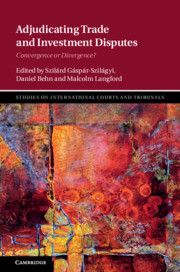Book contents
- Adjudicating Trade and Investment Disputes
- Studies on International Courts and Tribunals
- Adjudicating Trade and Investment Disputes
- Copyright page
- Contents
- Figures
- Tables
- Editors and Contributors
- Preface and Acknowledgements
- 1 Assessing Convergence in International Economic Disputes – A Framework
- Part I Dispute System Design
- Part II Use of Precedent across Regimes
- Part III Interpretive Powers and Adjudicative Behaviour
- 7 Inherent Powers of the WTO Appellate Body and ICSID Tribunals – A Tale of Cautious Convergence
- 8 The Use of Object and Purpose by Trade and Investment Adjudicators: Convergence without Interaction
- 9 Assessing Convergence between International Investment Law and International Trade Law through Interpretative Commissions/Committees: A Case of Ambivalence?
- 10 Regime Responsiveness in International Economic Disputes
- 11 Epilogue: ‘Convergence’ Is a Many-Splendored Thing
- Index
9 - Assessing Convergence between International Investment Law and International Trade Law through Interpretative Commissions/Committees: A Case of Ambivalence?
from Part III - Interpretive Powers and Adjudicative Behaviour
Published online by Cambridge University Press: 25 June 2020
- Adjudicating Trade and Investment Disputes
- Studies on International Courts and Tribunals
- Adjudicating Trade and Investment Disputes
- Copyright page
- Contents
- Figures
- Tables
- Editors and Contributors
- Preface and Acknowledgements
- 1 Assessing Convergence in International Economic Disputes – A Framework
- Part I Dispute System Design
- Part II Use of Precedent across Regimes
- Part III Interpretive Powers and Adjudicative Behaviour
- 7 Inherent Powers of the WTO Appellate Body and ICSID Tribunals – A Tale of Cautious Convergence
- 8 The Use of Object and Purpose by Trade and Investment Adjudicators: Convergence without Interaction
- 9 Assessing Convergence between International Investment Law and International Trade Law through Interpretative Commissions/Committees: A Case of Ambivalence?
- 10 Regime Responsiveness in International Economic Disputes
- 11 Epilogue: ‘Convergence’ Is a Many-Splendored Thing
- Index
Summary
This chapter focuses on treaty committees that share interpretative functions with adjudicative bodies. The author explores whether, and to what extent, joint interpretative commissions/committees are in fact signs of convergence between international investment law and international trade law. The author addresses convergence through the following four dimensions: spatial, temporal, ideological and functional. She concludes that the ideological dimension demonstrates a deeper convergence than can be seen from the space and time perspectives, namely the introduction of a new epistemic community into the field of international investment. Furthermore, the functional dimension shows lasting similarities and differences between the fields. Nevertheless, deeper analysis shows up complexity in reconciling states’ dual role as both respondents and interpreters in pending proceedings, and this is where convergence meets resistance.
Keywords
- Type
- Chapter
- Information
- Adjudicating Trade and Investment DisputesConvergence or Divergence?, pp. 211 - 243Publisher: Cambridge University PressPrint publication year: 2020



